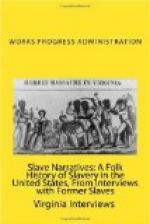“I ’members my gran’ma, too. Us always call her ‘Granny.’ She say dey stole her back in Virginny an’ brung ‘er to Mississippi an’ sol’ her to Marse Berry. Her name was Hannah. She was my mammy’s Mammy. I don’ ‘member nothin’ ’bout my pappy’s folks ‘cause I never seen none of’ em.
“Old Marster was a rich man for dat day. He had a sawmill, a cotton gin, an’ a gris’ mill. Us always had plenty t’eat an’ wear. Dey spun an’ weaved dey own cloth an’ made us clo’es out-a it.
“I can jus’ see de white folk’s house now. It was a big house, nice an’ clean, but twant painted. It had a row o’ rooms ‘cross dis way an’ a-nother row dat way wid a hall between. Dey had plenty o’ rooms for all dem boys an’ gals. Some of ’em was ’bout grown. De quarters[FN: slave quarters] was in de back o’ de house. De cook’s house was closes’ to de Big House, den nex’ was Granny’s house where us stayed. Den come a long row way down to de back fence.
“Dey didn’ have no overseer or driver. Dey was ‘nough o’ dem boys to look after de work an’ Old Marster say he don’ need no overseer to look after his slaves.
“My white folks was all Baptis’ an’ dey made us go to church, too. De church was called de Strong River Church. Dey had big baptisin’s. I ’members when I joined de church. De white folks preacher baptised us in de creek what run from Marse Berry’s mill pond. I was dressed up in a white lowell slip. When us dress’ up in Sund’y clo’es us had caliker[FN: calico] dresses. Dey sho’ was pretty. I ’members a dress now dat Old Marster bought for my granny. It was white an’ yaller, an’ it was de prettiest thing I ever seen.
“Us white folks was good to us. Dey warnt always a-beatin’ an’ a-knockin’ us ‘roun’. De truf is you couldn’ fin’ a scar on nary one o’ us. ‘Course, some times dey whup us, but dey didn’ gash us lak some o’ de old marsters did dey Niggers.
“When Old Marster died I didn’ know nothin’ bout him bein’ sick. He took a cramp colic in de night an’ was dead ‘fore mornin’. I hear somebody a-cryin’ at de Big House an’ Granny tol’ us dat Old Marster done die in de night. Dey had a big fun’al an’ all de folks come. De men carried him to de graveyard by de church. Dey didn’ have no hearses dem days. Twant far to de graveyard so dey jus’ toted de coffin to whar dey buried ’im. Dey put flowers in cups an’ vases on de grave, so’s dey wouldn’ wilt.
“Us was all sorry when Old Marster died, I cried ’cause I said, ’Now us won’ git no more candy.’ He used to bring us candy whan he went to town. Us’d be lookin’ for ’im when he come home. He’d say, ’Whars all my little Niggers?’ Den us’d come a-runnin’ an’ he’d han’ it to us out-a his saddle bags. It was mos’ly good stick candy.




